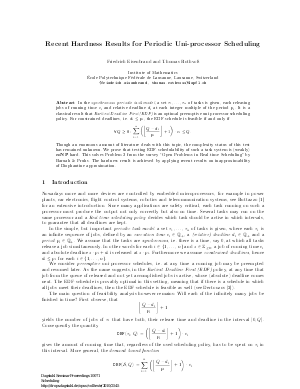Recent Hardness Results for Periodic Uni-processor Scheduling
Authors Friedrich Eisenbrand, Thomas Rothvoss
-
Part of:
Volume:
Dagstuhl Seminar Proceedings, Volume 10071
Part of: Series: Dagstuhl Seminar Proceedings (DagSemProc) - License:
 Creative Commons Attribution 4.0 International license
Creative Commons Attribution 4.0 International license
- Publication Date: 2010-05-03
File

PDF
DagSemProc.10071.10.pdf
- Filesize: 211 kB
- 7 pages
Document Identifiers
Subject Classification
Keywords
- Hardness
- periodic scheduling
- uni-processor scheduling
Metrics
- Access Statistics
-
Total Accesses (updated on a weekly basis)
0Document
0Metadata
Abstract
Consider a set of $n$ periodic tasks $ au_1,ldots, au_n$ where $ au_i$ is described
by an execution time $c_i$, a (relative) deadline $d_i$ and a period $p_i$.
We assume that jobs are released synchronously (i.e. at each multiple of $p_i$) and consider pre-emptive, uni-processor schedules.
We show that computing the response time of a task $ au_n$ in a Rate-monotonic schedule
i.e. computing
[
minleft{ r geq mid c_n + sum_{i=1}^{n-1} leftlceil frac{r}{p_i}
ight
ceil c_i leq r
ight}
]
is (weakly) $mathbf{NP}$-hard (where $ au_n$ has the lowest priority and the deadlines
are implicit, i.e. $d_i = p_i$).
Furthermore we obtain that verifying EDF-schedulability, i.e.
[
forall Q geq 0: sum_{i=1}^n left( leftlfloor frac{Q-d_i}{p_i}
ight
floor +1
ight)cdot c_i leq Q
]
for constrained-deadline tasks ($d_i leq p_i$) is weakly $mathbf{coNP}$-hard.
Cite As Get BibTex
Friedrich Eisenbrand and Thomas Rothvoss. Recent Hardness Results for Periodic Uni-processor Scheduling. In Scheduling. Dagstuhl Seminar Proceedings, Volume 10071, pp. 1-7, Schloss Dagstuhl – Leibniz-Zentrum für Informatik (2010)
https://doi.org/10.4230/DagSemProc.10071.10
BibTex
@InProceedings{eisenbrand_et_al:DagSemProc.10071.10,
author = {Eisenbrand, Friedrich and Rothvoss, Thomas},
title = {{Recent Hardness Results for Periodic Uni-processor Scheduling}},
booktitle = {Scheduling},
pages = {1--7},
series = {Dagstuhl Seminar Proceedings (DagSemProc)},
ISSN = {1862-4405},
year = {2010},
volume = {10071},
editor = {Susanne Albers and Sanjoy K. Baruah and Rolf H. M\"{o}hring and Kirk Pruhs},
publisher = {Schloss Dagstuhl -- Leibniz-Zentrum f{\"u}r Informatik},
address = {Dagstuhl, Germany},
URL = {https://drops.dagstuhl.de/entities/document/10.4230/DagSemProc.10071.10},
URN = {urn:nbn:de:0030-drops-25458},
doi = {10.4230/DagSemProc.10071.10},
annote = {Keywords: Hardness, periodic scheduling, uni-processor scheduling}
}
